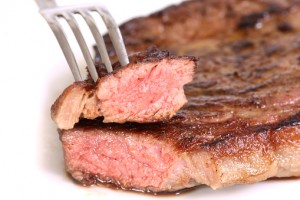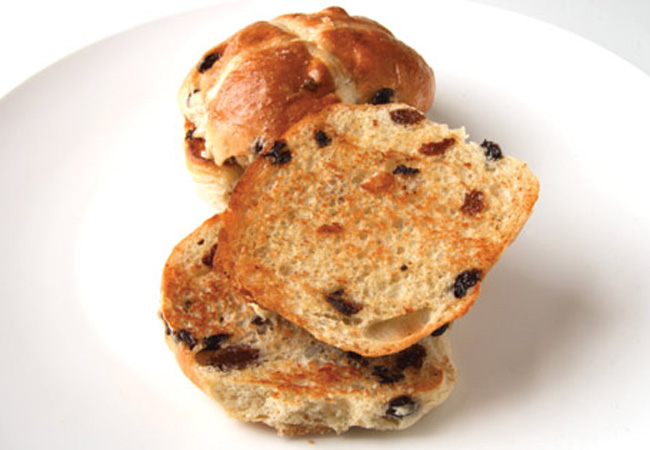Inflammatory bowel disease (IBD) increases with red meat consumption: Study
 Inflammatory bowel disease (IBD) increases with red meat consumption, according to research. The findings come from a meta-analysis, where researchers found a correlation between red meat consumption and inflammatory bowel disease.
Inflammatory bowel disease (IBD) increases with red meat consumption, according to research. The findings come from a meta-analysis, where researchers found a correlation between red meat consumption and inflammatory bowel disease.
The researchers looked at studies published between July 1966 and July 2015. Studies contained information about Crohn’s disease, ulcerative colitis, IBD, and meat consumption. Red meat was defined as “darker-colored meat from mammals, such as cows, sheep/lambs, pigs, and horses” and white meat as “lighter-colored meat from poultry, such as chickens, and rabbits.”
Nine studies were included in the meta-anaysis and the results suggested that higher red meat consumption was associated with a higher risk of IBD.
There are several explanations for the findings. For example, cooking meats at higher temperatures generated by-products, which contain mutagenic or carcinogenic characteristics that may cause a negative impact on the digestive tract. Another explanation may be that heme iron found in red meat leads to the formation of N-nitroso compounds that impacts cells’ proliferation activity in the digestive system. Lastly, fat consumption from animals is also associated with higher risks of Crohn’s disease, ulcerative colitis, and IBD.
The study revealed an association between meat consumption and IBD risk, but additional research is required to better understand the association.
Food and eating in IBD
Food and eating can be quite challenging to navigate if you have inflammatory bowel disease. Some foods act as flare triggers, so it can almost seem like a game of Russian roulette every time you consume something. Furthermore, IBD may contribute to a loss of appetite, poor digestion, and malnutrition, which can make eating even more of a struggle.
Knowing what you can and cannot eat can help you better manage your IBD and ensure that you avoid many other harmful complications as well. In general, all persons should be consuming well-rounded meals that contain a balance between the major food groups and that offer nutritional value. For those with IBD, there are other factors one may have to keep in mind when choosing a diet. Do you have a bowel blockage or intestinal stricture? What part of the intestine is affected? Is the disease active or in remission? These are good questions to ask when devising a meal plan for managing your IBD.
Here are some key points when considering a healthy eating plan with IBD:
- Drink plenty of water
- Eat carbohydrates with soluble fiber
- Eat protein, like eggs, fish, poultry, nuts, and soy
- Consume healthy fats like omega-3, olive oil, etc.
- Consume deep-colored – skinless and seedless – fruits and cooked vegetables
- Take supplements with your doctor’s approval
- Avoid calcium or dairy products if you are lactose intolerant
Furthermore, the below chart will assist you in eating when your disease is active.
If you’re still struggling with food and eating while living with IBD, you may want to work with a nutritionist or dietician to help you create a meal plan that you can follow and that will provide you with the essential nutrients you need.
Related Reading:
Inflammatory bowel disease (IBD) linked to diversity of viruses and gut bacteria
In ulcerative colitis, patients more concerned about IBD complications than treatment side effects
-
5-Minute Watermelon Frappe
This is a perfect snack for a hot summer afternoon. Prep and Cook
-
Choosing The Best Weight Loss System For You
Im hoping that this information will help you decide on a good weight
-
Copy Three Healthy Habits of Slim Fit People
If you are having a struggle with gettin
-
U.S. Weight Loss Market To Reach 58 Billion in 2007
Marketdata Enterprises, Inc. has released a new 393-page study entitle
-
Dieting Stifles Creativity Hypnosis To End Self Expression Through Eating
Emotional eating habits that keep us overweight with the subconscious
-
Learn More About Laparoscopic Weight Loss Surgery
Do you have a problem with your weight? A regimen of diet and exe
- DON'T MISS
- Effective and Proven Ways to Lose Leg Fat Fast
- How To Achieve Weight Loss
- Why We Are Getting Fatter
- Healthy Living - The Best Ways of Fighting Obesity
- Consumer Health Awareness Can Help You Plan a Healthy Meal Plan
- Law Of Attraction For Weight Loss Your Secret To Dropping Unwanted Weight Once And For All
- When Others Are Jealous Of Your Weight Loss Success
- Stubborn Fat Part 5
- 12 Habits Of People Who Reach (And Maintain) Their Goal Weight
- Learning About the Life of Richard Simmons




